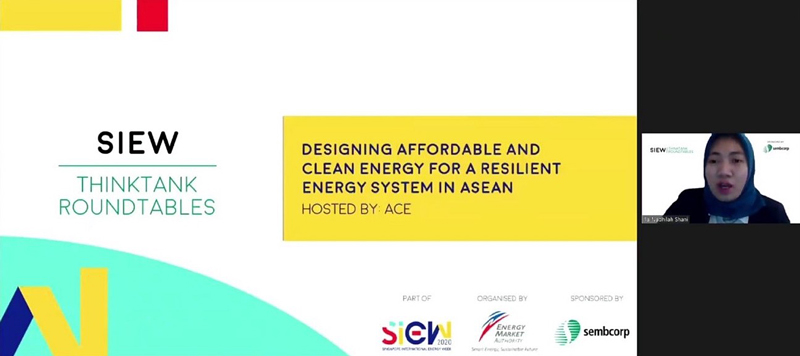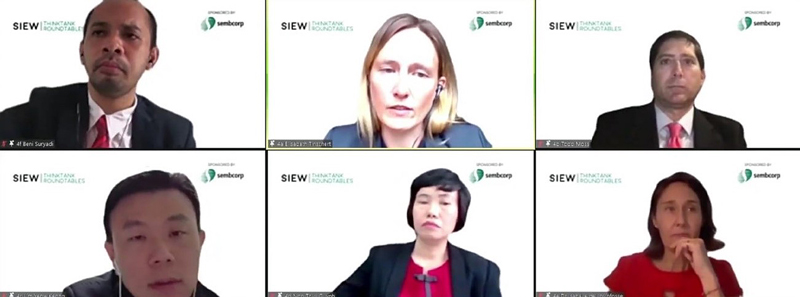New policies, technologies and investment approaches to strengthen energy system resilience in the Southeast Asian region were discussed at SIEW Thinktank Roundtable B hosted by the ASEAN Centre for Energy (ACE). Our correspondent Kim Jin reports.

Dr Nuki Agya Utama, Executive Director of ACE opened the Roundtable with the observation that low carbon developments are challenging—but achievable—to create secure and resilient energy systems. He added that two flagship documents, the ASEAN Energy Outlook and the ASEAN Plan of Action for Energy Cooperation 2020-2024, would also be launched at the 38th ASEAN Minister of Energy Meeting (AMEM) in November.
Three keynote addresses followed and set the tone for the rest of the session:
- H.E. Damilola Ogunbiyi, Chief Executive Officer of Sustainable Energy for All and Special Representative of the UN Secretary-General, shared that at the current pace, the world would not achieve the Sustainable Development Goal 7 (SDG 7). She noted that in ASEAN, access to electricity had improved but 789 million globally remained unconnected to the grid. Further investments and dialogues were needed.
- H.E. Jon Lambe, Ambassador of the United Kingdom to ASEAN, commented that ASEAN was undergoing a strong energy transition and shared the UK’s experience in moving almost completely away from coal generation in five years. He also remarked that between 1990 and 2019, emissions fell by 40% while the economy grew 70%—demonstrating how energy transition can co-exist with growth and deliver real benefits.
- H.E. Morten Høglund, Ambassador of Norway to ASEAN, highlighted that more effort was needed to accelerate the global momentum towards SDG 7 and Paris Accord goal.
Regional perspectives on clean energy developments
Ms Nadhilah Shani, ACE Researcher in the Power, Fossil Fuel, Alternative Energy and Storage, highlighted that affordability components in ASEAN varied significantly. For example, Vietnam was coal-rich and Thailand was gas-rich. Renewables deployment would help lift communities out of poverty and reduce emissions.
Ms Ngo Thuy Quynh, Deputy Director-General of the Oil and Gas and Coal Department, Ministry of Industry and Trade, Vietnam, presented an overview of the country’s renewables policies and challenges to its integration on a large scale in Vietnam. Transmission grid planning needed to be adjusted, she observed, and the progress was complicated by a longer lead time than wind or solar projects.

Dr Isabelle de Lovinfosse, Head of the COP26 in Southeast Asia, shared her insight that every dollar invested in the global energy transition yields 3-8 dollars in return.

The presentations were followed by a panel discussion moderated by Mr Beni Suriyadi, Manager of the Power, Fossil Fuel, Alternative Energy and Storage, ACE.
- During the discussion, Mr Todd Moss, Executive Director, Energy for Growth Hub, emphasised that while renewables were becoming cheaper, they still needed to be paired with gas plants for system reliability.
- Ms Elisabeth Tinschert, Project Manager of the Clean, Affordable, and Secure Energy for Southeast Asia (CASE) Project of GIZ GmbH, noted that the transition to renewables would lead to more regional cooperation and job opportunities—and that ASEAN could define its own energy transition.
- Mr Lim Yeow Keong, Senior Vice President of Strategic Partnerships and Origination, Sembcorp Industries, noted that the private sector had been deploying innovative financing schemes and unconventional sources of funds, triggering domino effects that accelerate falling costs of renewables at scale.
Follow us on Twitter (@SIEW_sg) to get the latest #SIEW2020 updates throughout the day!